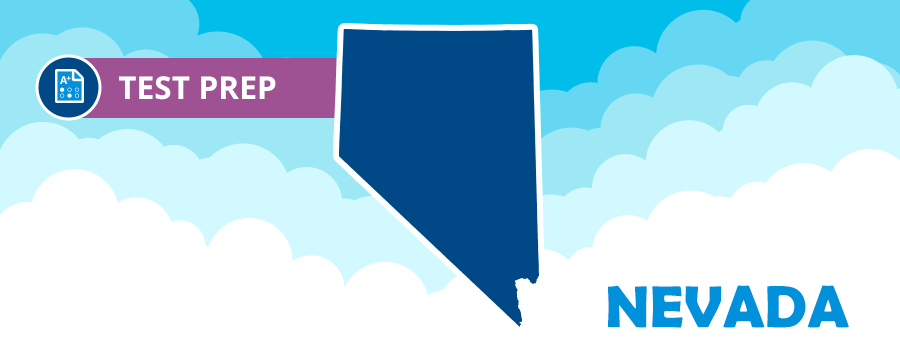Standardized Test Prep in Nevada
Understanding Nevada state testing can be a challenge, but this can be important for improving your child’s likelihood of academic success. Time4Learning is here to help to reduce some of the anxiety you may have about Nevada state assessments.
Continue reading to discover what standardized tests are required for public school students in Nevada, how Time4Learning can be used as an aid for test preparation whether your children are homeschooled or not, and so much more.
Which State Tests Are Available in Nevada?
Standardized tests in Nevada are aligned with both federal and state education laws and are based on state-adopted learning standards. The goal is to prepare and assess students’ readiness for success in the global world of the 21st century.
Below are the Nevada standardized tests currently required for public school students:
- Brigance Early Childhood Screens III – The Brigance is a diagnostic/intake screening for all students entering Kindergarten. This one-time school readiness assessment can identify early signs of giftedness or developmental delay.
- Measures of Academic Progress (MAP Reading) – The MAP Reading assessment is a diagnostic and formative assessment for all students in grades K-3. It is used to identify and support students who have challenges in reading.
- Smarter Balanced Assessment (SBAC) – The SBAC is a standardized summative assessment given to all students in grades 3-8. It uses computer-adapted and performance tasks to gauge student abilities in reading and math and provide a measure of school accountability.
- Science – This standards-based summative assessment assesses the science proficiency of students in grades 5, 8, and high school. It is used to identify and support struggling schools. Students in 5th and 8th grade are tested on NGSS domains of Life Science, Physical Science, and Earth/Space Science while the high school assessment targets primarily Life Science.
- End of Course Examinations (EOC) – End of course exams in Nevada are taken in grades 7-12 for particular courses and focus on the content of the individual courses. They are aligned to state standards and are administered and scored at the school/district level (with the exception of the writing section, which is hand-scored by the state’s assessment vendor). EOC examinations are administered in the following areas to measure individual student performance: Math I (emphasis on algebra), Math II (emphasis on geometry), Integrated Mathematics 1, Integrated Mathematics 2, ELA I (focus on reading comprehension), and ELA II (focus on writing).
- College and Career Readiness Assessments (ACT plus Writing) – The state of Nevada offers one free administration of this standardized summative college and career readiness assessment to all 11th grade students for the purpose of school accountability. Students may retake the ACT for college entrance purposes but must pay the testing fee. ELA sections cover reading, writing, and English usage while the math section targets middle and high school math standards. The science section focuses on content expected for college and career readiness.
- English Language Proficiency Assessment (WIDA ACCESS/WIDA Alternate ACCESS) – The WIDA ACCESS is a standardized summative assessment that is offered annually to students in grades K-12 who have been identified as English Language Learners. It measures English reading, writing, listening, and speaking and provides information regarding student needs and school accountability. These students also take the SBAC and science assessments. English Language Learners with significant cognitive and developmental delays (less than 1% of English Language Learners statewide) take the individually administered WIDA Alternate ACCESS to identify student needs and provide accountability for the schools.
- Nevada Alternate Assessment (NAA) – The individually-administered summative NAA is given to students in grades 3-12 with significant cognitive and developmental challenges (less than 1% of students statewide) who are unable to successfully complete the SBAC and Science assessments. It measures proficiency in reading and math for students in grades 3-8 and 11 and science in grades 5, 8, and 11, and it provides an indicator of school success.
- Career & Technical Education (CTE) – The CTE summative assessment is given to students in grades 9-12 who are completing career and technical education programs. It includes a Workplace Readiness Skills Assessment that measures employability skills based on the state’s Career Readiness standards and the End-of-Program Technical Assessments that measure program-specific skills. The purpose of the CTE assessment is to certify whether students have skills necessary for their chosen trades and is a program requirement for graduation.
Federal law requires substantial but not universal participation in state assessments, and Nevada state law does not specifically mandate state testing. As a result, individual school districts in Nevada have the right to determine whether or not to allow parents to “opt out” their children. Check with your local school district to find out its policies on opting out of state testing.
Do Homeschoolers Have To Take Standardized Tests in Nevada?
According to Nevada homeschool laws, no standardized tests are required for homeschool students in Nevada. However, as a homeschool family, you may choose to have your children take state tests in order to measure your child’s progress from year to year.
Testing may be important if you are considering transitioning back to public school, or if you want to use test scores toward entrance requirements for colleges. Homeschool students are able to take the state tests at public schools (with prior approval), or they can access standardized tests through alternate providers.
How Time4Learning Can Help with Nevada Test Prep
Whether your child is a public school student who needs additional support or a homeschool student working toward college or career goals, Time4Learning’s online PreK-12th grade curriculum can help to prepare your child for standardized tests in Nevada.
Here are just some of the ways that Time4Learning can help:
- Families with young students can access our Pre-K curriculum, which includes dozens of lessons to improve communication, language, and literacy skills, all key in prepping them for standardized tests, like Nevada’s Brigance screenings and MAP reading assessments.
- Time4Learning’s elementary curriculum can help prepare students for Nevada’s SBAC assessments with practice in foundational skills like reading comprehension, grammar and Time4MathFacts.
- Students can prepare for the science assessments through Time4Learning’s engaging online science curriculum.
- Our middle school curriculum and high school curriculum includes chapters, interactive activities, worksheets, and quizzes to help prepare students in the areas of math, language arts, and science, which are targeted on the EOC and ACT assessments.
- Time4Learning can serve as an ESL supplement in order to build and practice language skills for English Language Learners taking the WIDA ACCESS assessments.
- The IBCCES has recognized the Time4Learning curriculum as a Certified Autism Resource for students with different learning abilities.
- Students are motivated by Time4Learning’s interactive and engaging lessons where they will learn strategies and skills (many of which will benefit test-taking) while having fun.
- Time4Learning curriculum activities and quizzes allow for immediate feedback as well as the option to retake tests and quizzes, helping students to build confidence, learn strategies to better test scores, and understand their own learning.
Through preparation and practice, your child can achieve successful results on their Nevada standardized test scores. In addition, skill-building programs like Time4Learning can prepare your child and build their confidence before they walk in the door.
The software is a game changer!
By Regina
“…she leaped ahead of her peers on her state test when returned to public school, we used it during homebound when there was a mismedication, and use it now as a supplement for a teacher that refuses to teach.”







